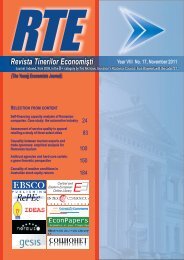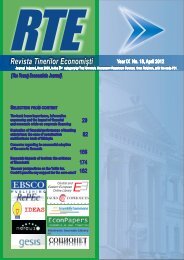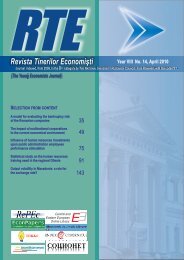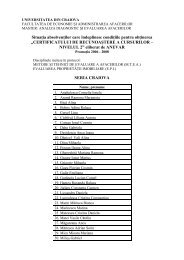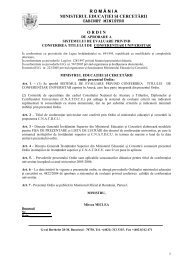Revista Tinerilor Economiºti (The Young Economists Journal)
Revista Tinerilor Economiºti (The Young Economists Journal)
Revista Tinerilor Economiºti (The Young Economists Journal)
You also want an ePaper? Increase the reach of your titles
YUMPU automatically turns print PDFs into web optimized ePapers that Google loves.
<strong>Revista</strong> <strong>Tinerilor</strong> Economişti (<strong>The</strong> <strong>Young</strong> <strong>Economists</strong> <strong>Journal</strong>)<br />
development of foreign markets could occur from proper misunderstanding of foreign<br />
consumers’ mentalities or from underestimation of competitors’ force.<br />
Table no. 1 Number of markets developed by retailers versus their total business turnover<br />
Retail Group Origin Turnover (billion Nr.<br />
Number of markets<br />
country<br />
EUR)<br />
employees WE EE RW T<br />
Metro Group Germany 66,25 251.338 13 14 7 34<br />
Schwarz Group Germany 54,89 280.000 17 9 - 26<br />
Carrefour France 87,75 475.976 6 6 12 24<br />
Aldi Germany 40,59 500.000 12 4 2 18<br />
Rewe Group Germany 50,91 326.000 5 9 - 14<br />
Wal-Mart USA 285,75 2.100.000 1 - 15 16<br />
Tengelmann Germany 24,17 167.500 3 10 - 13<br />
Auchan France 39,48 165.000 5 5 3 13<br />
Tesco UK 54,56 468.508 2 5 7 14<br />
Caption: WE – Western Europe, EE – Eastern Europe, RW – Rest of the world (America, Asia,<br />
etc), T – total developed markets; Date valid for 2010 expressed in billion EUR;<br />
Sources: ***, Metro Handelslexikon 2010/2011, pp.76-89; ***, <strong>The</strong> Global 2000 Rank 2010;<br />
companies own websites.<br />
Surviving in an intensively competitive environment may be, of course, more<br />
easily achieved by a retailer with a large turnover than by a retailer with a little one,<br />
who therefore has a limited experience with foreign markets. <strong>The</strong> current<br />
internationalisation process of retailers is in fact a somewhat beaten path, namely by the<br />
producers in the 70-ties and 80-ties of the twentieth century [Liebmann, Zentes,<br />
Swoboda, 2008, p.346].<br />
Most European retail chains (Carrefour, Metro, Ahold, Tesco, Rewe, ITM<br />
Enterprizes, Edeka, Lidl / Schwarz, Auchan, Spar International) are active in the food<br />
sector [Stănciulescu, Hallier, 2006, pp.500-502]. <strong>The</strong>y realized the importance of<br />
globalization in time, and properly perceived the need of “reactive expansion” in<br />
Central and Eastern Europe [Zentes, Swoboda, Schramm-Klein, 2010, p.244]. <strong>The</strong>ir<br />
expansion into in culturally and geographically neighbouring foreign markets, becomes<br />
a fundamental strategic choice [Gielens, Dekimpe, 2007, pp.196-212].<br />
This concept has not been sufficiently applied so far. Many retailers were not<br />
able to rapidly shift resources abroad, and to adapt themselves to foreign cultural, legal,<br />
and political conditions. Saturation tendencies of demand in home markets, however,<br />
forces competitors to extend to foreign markets. Even market leaders sometimes fail to<br />
intrude into foreign markets because of misperception of the specific conditions abroad.<br />
For example, Wal-Mart, the biggest worldwide retailer with an estimated<br />
turnover in 2008 of USD 405 billion, decided in 1997 to penetrate the German market.<br />
With an initial investment of about U.S. 1.6 billion and losses of more than U.S. 3<br />
billion they had to give in due to the strong competition of the German discounters Aldi<br />
and Lidl, Wal-Mart had failed to build up an appropriate image in Germany. In July<br />
2006, Wal-Mart sold the German chain consisting of 85 stores to its competitor Metro<br />
[Pop, Dabija, 2008, pp.1099-1105].<br />
Another trend is that of transit or “adventure” retailing, close to the boundaries<br />
of selected regions or countries. In 2005, 1.07 million Swiss households (compared<br />
with 0.18 million in 2002) “preferred” to make purchases outside their country,<br />
especially in Germany. As to the factors that have contributed to this trend we refer to<br />
[Zentes, Swoboda, Schramm-Klein, 2010, p.343]:<br />
64



